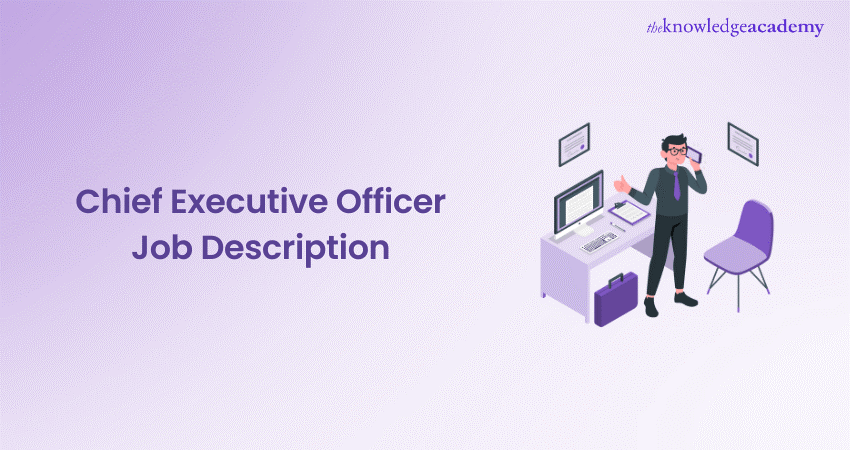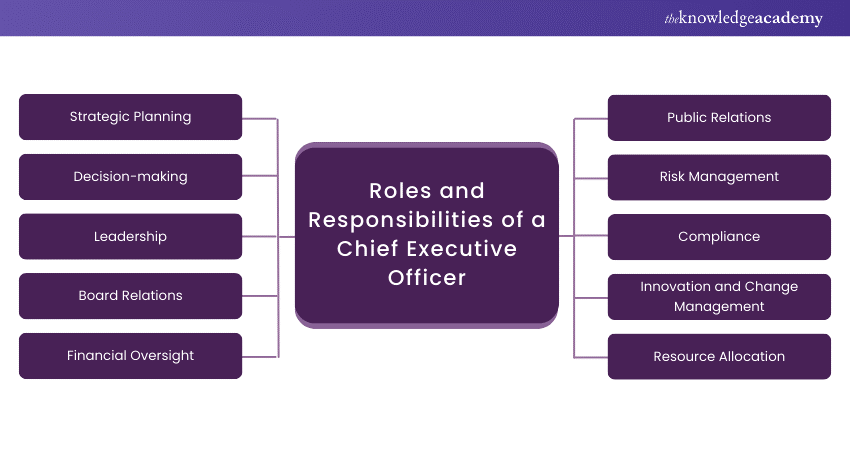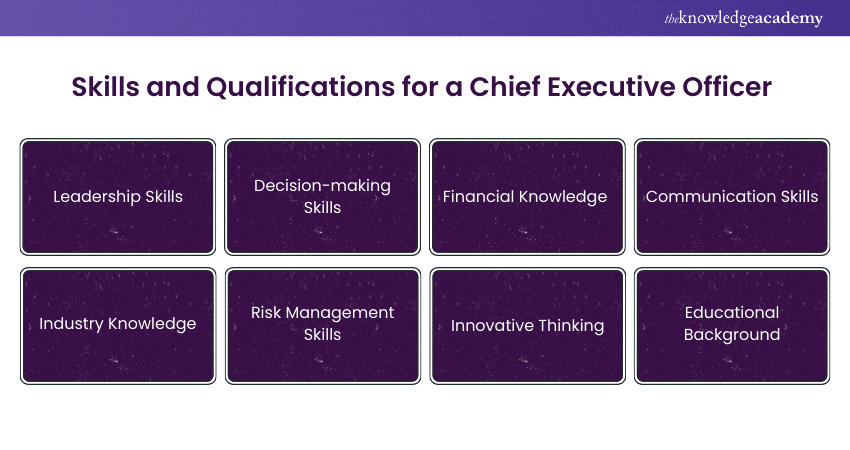We may not have the course you’re looking for. If you enquire or give us a call on +49 8000101090 and speak to our training experts, we may still be able to help with your training requirements.
Training Outcomes Within Your Budget!
We ensure quality, budget-alignment, and timely delivery by our expert instructors.

Are you curious about what it takes to lead a company? In this blog, we discuss the Chief Executive Officer Job Description and uncover the key responsibilities and skills needed for this top leadership role. From strategic planning to team management, discover how CEOs drive their organisations to success. Whether you’re aspiring to be a CEO or just interested in learning more, this blog provides valuable insights into the world of executive leadership.
Table of Contents
1) Who is a Chief Executive Officer?
2) Key Roles and Responsibilities of a Chief Executive Officer
3) Essential Skills and Qualifications for a Chief Executive Officer
4) Template for Chief Executive Officer Job Description
5) Conclusion
Who is a Chief Executive Officer?
The Chief Executive Officer (CEO) is the driving force behind a company’s success. They wear multiple hats, overseeing critical functions such as finance, marketing, sales, HR, technology, and legal matters. The CEO’s tightrope act involves balancing the needs of customers, employees, investors, and other stakeholders. As the company’s public face, they navigate the spotlight with finesse. Other titles for this pivotal role include managing director and president.
In essence, the CEO orchestrates the symphony of business, harmonising diverse elements to achieve strategic goals. Their decisions ripple through the organisation, shaping its destiny. Whether steering a startup or captaining a multinational corporation, the CEO’s vision and leadership set the course for prosperity or adversity.
Key Roles and Responsibilities of a Chief Executive Officer
The roles of a CEO are important for the functioning and success of an organisation. Here are some of the key responsibilities:

a) Strategic Planning: The CEO is required to set out the strategic management of the company. This involves forming strategies and defining prospects in the long-run. They make sure that strategies developed are in line with the company’s mission and vision statements.
b) Decision-making: CEOs are the ones who make most of the major decisions in the company. It involves making strategic choices about different matters, including investment, alliances, and operational strategies. These choices have many repercussions for the future of the business.
c) Leadership: The CEO oversees the performance of the company as well as its employees. This includes workforce activation and the creation of a positive organisational climate. They make sure that the employees are in harmony with the organisational objectives and the organisational culture.
d) Board Relations: The CEO has the central responsibility of managing the relationship between the board of directors and the business institution. They report the progress status to the board and also seek their approval on any key matters of concern.
e) Financial Oversight: CEOs are accountable for all the company’s financial situation. This includes the area of control over budgets as well as control of finances to ensure that the company is profitable.
f) Public Relations: The CEO often speaks on behalf of the company during interviews, conferences and other community related occasions. Most are involved in constructing and defending the organisation’s image and brand.
g) Risk Management: CEOs come up with the risks that are likely to affect the business and find ways of avoiding that risk. These are financial risks, operational risks and strategic risks.
h) Compliance: Adherence to legal obligations is among the main concerns of any business. The basic requirement is that the CEO be aware of regulations and that the company must follow them.
i) Innovation and Change Management: CEOs, therefore, promote change by initiating new products, services, and processes within the company. Any organisation needs to follow market trends and other business-related environments.
j) Resource Allocation: Proper management of resources such as manpower, finance, and technology also requires consideration. The CEO also safeguards that the resources are deployed to foster the attainment of strategic objectives.
Learn leadership principles with our CMI Level 7 Diploma in Strategic Management and Leadership Practice – join today!
Essential Skills and Qualifications for a Chief Executive Officer
Individuals need a combination of skills and qualifications to excel in the role of a CEO. Here are some of them:

a) Leadership Skills: Leadership skills are crucial for guiding the company and its employees. This includes the talent to inspire, motivate, and manage people effectively.
b) Decision-making Skills: Effective decision-making skills are vital, as CEOs make critical decisions that affect the company's direction and success. They must be able to analyse information, consider various perspectives, and make informed choices.
c) Financial Knowledge: An understanding of financial principles is essential. CEOs need to manage budgets, analyse financial statements, and make decisions that ensure the company's financial health.
d) Communication Skills: Communication skills are necessary for interacting with the board of directors, employees, stakeholders, and the public. CEOs must be able to convey information clearly and persuasively.
e) Industry Knowledge: Deep knowledge of the industry in which the company operates is important. This includes understanding market trends, competitive dynamics, and regulatory requirements.
f) Risk Management Skills: CEOs must be adept at finding risks and developing strategies to mitigate them. This includes financial risks, operational risks, and strategic risks.
g) Innovative Thinking: The capacity to think creatively and drive innovation is important for staying competitive. CEOs should encourage new ideas and approaches within the company.
h) Educational Background: Most CEOs have a strong educational background, often including an advanced degree such as an MBA. Relevant experience in the industry and in leadership roles is also highly valued.
Understand the essential elements of successful coaching with our CMI Level 7 Award in Leadership Coaching and Mentoring Training – Join today!
Template for Chief Executive Officer Job Description
|
Job Title: Chief Executive Officer (CEO) Location: [Company Location] Job Type: Full-time About Us: [Company Name] is a leading organisation dedicated to innovation, growth, and excellence in our industry. We pride ourselves on our commitment to delivering quality products and services to our clients. Our team values integrity, collaboration, and forward-thinking leadership. Job Summary: We are seeking an experienced Chief Executive Officer (CEO) to lead our company. The ideal candidate will have a track record of strategic leadership and operational excellence. This role involves driving the company’s strategic direction and fostering innovation and excellence. Key Responsibilities: a) Collaborating with senior officers to drive growth, enhance sustainability, and fortify the organisation’s position. b) Representing the organisation at functions, industry events, and public meetings. c) Working closely with the Chief Financial Officer to create annual budgets, assess investment risks, and advise the board on financial matters. d) Shaping short- and long-term strategies and policies aligned with the board’s goals and vision. e) Guiding the organisation toward its objectives as set by the board of directors. f) Coordinating with the Head of Human Resources on payroll, benefits, and hiring practices. g) Setting departmental goals in collaboration with heads of departments to ensure overall quality. h) Engaging with shareholders, the public, and government entities Qualifications: a) Master’s degree in Business Administration or Management. b) Proven experience as a CEO or in a similar senior executive role. c) Understanding of corporate finance and management principles. d) Excellent communication, negotiation, and leadership skills. e) Strategic thinker with strong business acumen. f) Experience in developing growth strategies. g) Strong organisational skills and attention to detail. What We Offer: a) Competitive salary based on experience and qualifications. b) Benefits package including health, dental, and retirement plans. c) Opportunities for professional growth and development. d) A supportive and collaborative work environment. How to Apply: Submit your resume and cover letter to [email address] by [application deadline]. |
Conclusion
The position of a Chief Executive Officer is both challenging and rewarding. CEOs are responsible for steering the company towards success through strategic planning, effective leadership, and sound decision-making. With the right combination of skills and qualifications, individuals can make an impact on their organisation's growth. Understanding the Chief Executive Officer’s Job Description is essential for those aspiring to take on this influential position.
Learn to communicate with stakeholders with our CMI Level 7 Award in Strategic Management and Leadership Practice Training – Join today!
Frequently Asked Questions

Yes, the CEO reports to the Chairman of the board of directors. The Chairman oversees the board, while the CEO manages the company's day-to-day operations.

Not necessarily. The CEO is an executive hired to run the company, whereas the owner holds the ownership stakes or shares in the business.

The Knowledge Academy takes global learning to new heights, offering over 30,000 online courses across 490+ locations in 220 countries. This expansive reach ensures accessibility and convenience for learners worldwide.
Alongside our diverse Online Course Catalogue, encompassing 17 major categories, we go the extra mile by providing a plethora of free educational Online Resources like News updates, Blogs, videos, webinars, and interview questions. Tailoring learning experiences further, professionals can maximise value with customisable Course Bundles of TKA.

The Knowledge Academy’s Knowledge Pass, a prepaid voucher, adds another layer of flexibility, allowing course bookings over a 12-month period. Join us on a journey where education knows no bounds.

The Knowledge Academy offers various CMI Level 7 Training, including CMI Level 7 Award in Strategic Management and Leadership Practice Course, CMI Level 7 Diploma in Strategic Management and Leadership Practice Training, and CMI Level 7 Award in Leadership Coaching and Mentoring Training. These courses cater to different skill levels, providing comprehensive insights into Difference Between ILM and CMI.
Our ILM, CMI Leadership & Management Blogs cover a range of topics related to CMI, offering valuable resources, best practices, and industry insights. Whether you are a beginner or looking to advance your Management skills, The Knowledge Academy's diverse courses and informative blogs have you covered.
Upcoming ILM, CMI Leadership & Management Resources Batches & Dates
Date
 CMI Level 7 Award in Strategic Management and Leadership Practice Training Course
CMI Level 7 Award in Strategic Management and Leadership Practice Training Course







 Top Rated Course
Top Rated Course



 If you wish to make any changes to your course, please
If you wish to make any changes to your course, please


